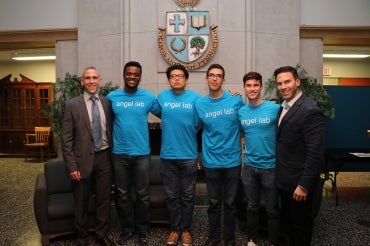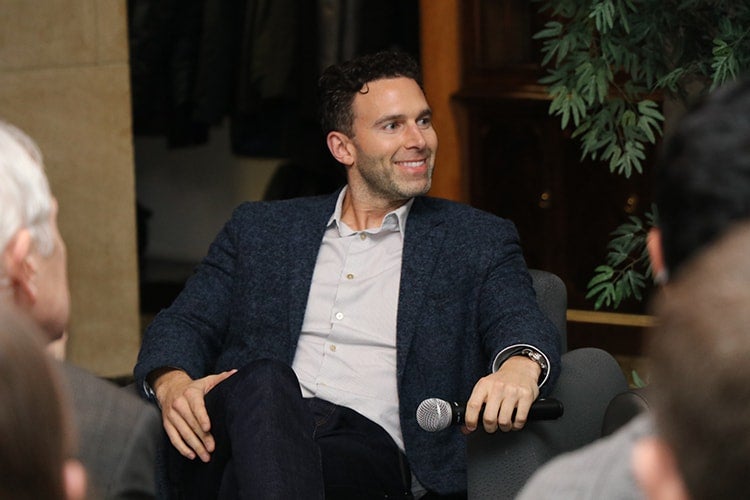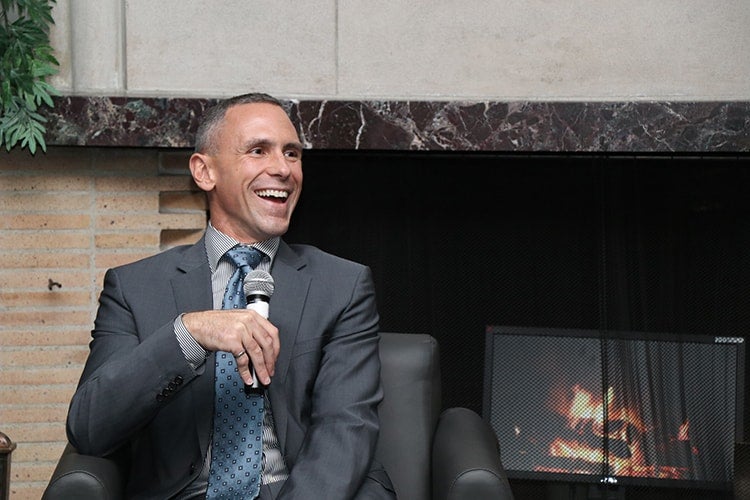St. Mike's Angel Lab hosts tech leaders Anthony Lacavera and Mark Palma at U of T

Published: January 10, 2017
Dealing with “spectacular failures” and the politeness of Canadians – those were just some of the challenges faced by Canadian tech entrepreneurs and U of T alumni Anthony Lacavera and Mark Palma.
The alumni and business partners shared their experiences recently with students interested in developing social justice startups at U of T’s St. Michael’s College.
“I’ve had some spectacular failures,” Lacavera said, recalling that in the early 2000s, “I wanted to make payphones free, and sell ads…I would not let it go.”
It took three years and millions of dollars before he finally admitted defeat, he added.
The fireside chat was attended by St. Michael's College President and Vice-Chancellor David Mulroney and Principal and Vice President Randy Boyagoda.
It was organized and hosted by students from Angel Lab, an initiative St. Mike’s launched last year to help undergrads start enterprises with a social impact. The startup effort is just one of the many ways St. Mike’s has been helping students connect faith with academics – the college's recent initiatives have been featured in the Globe and Mail.
Read the Globe and Mail story

WIND Mobile founder Anthony Lacavera answering students' questions during the fireside chat
Lacavera, who founded WIND Mobile and Globalive, and Palma, who manages Globalive, have known each other since their days in St. Mike’s residence.
Though Toronto is now home to incubators, accelerators, and a tech-friendly venture capital network, the city and academic institutions were not always so hospitable to business projects, said Lacavera.
“It’s great to see senior leadership [at St. Michael’s] supporting startup initiatives,” Lacavera said. “The world was so much more difficult to navigate in the mid ‘90s, pre-Internet.”
Read more about Angel Lab
Lacavera and Palma talked about the importance of character, a positive outlook and a willingness to work hard – and the pair said their relationship as co-founders was instrumental in helping them succeed.
Palma and Lacavera grew up together in Welland, Ont. They attended St. Mike’s where they lived in residence for the duration of their U of T careers. Both pursued computer engineering.
“I forged many of the friendships that are now lifelong. The community … is very powerful,” Lacavera said of St. Mike’s where he was known to parade around residence in a toga, declaring himself “the emperor of More House.”
Palma said St. Mike’s exposed small-town students like him to a much larger and more culturally diverse world – an essential piece of education for anyone working in today’s cosmopolitan tech industry.
Earning trust was a challenge in those early days, Lacavera said. As a business owner fresh out of university, he found himself at the head of a team of people who were years older than he was.

Mark Palma talks about his experiences at St. Mike's and in the business world
Lacavera said the only option for establishing trust and leading effectively was total transparency.
“I told people the whole, complete truth,” and this helped him to develop a “very loyal team.”
Palma added: “You have to know what you don’t know.”
Honesty and humility about unknown risks or issues can help go a long way towards creating trust with clients and employees in the tech industry, they said.
Lacavera recalled having to apply for his first business loan at an RBC branch. Today, things are a bit easier for raising capital.
WIND Mobile, a company Lacavera founded in 2008 despite widespread doubt and opposition, sold for $1.6 billion CAD in 2015. (The company has since been rebranded as Freedom Mobile.) The move to create WIND was “seen as suicidal” at the time, Lacavera said. Telus, Rogers and Bell appeared too deeply entrenched to allow a new wireless communications provider to enter the fray. Lacavera staked his decade-long record of business success with Globalive Communications in order to launch WIND, and the risk paid off.
Asked how to go about pitching unproven technologies to investors, Lacavera stressed the importance of knowing both the technology and the client’s industry.
The first step, he said, is getting your client to believe you about the outcomes that your product can deliver.
Most people will not be convinced by the pitch, but because “Canadians are really polite,” they might not directly communicate their skepticism, he said. For those who are convinced, “you need to lead them to that outcome,” and “you have to ask for the sale,” he said.
Palma agreed and further emphasized the importance of creating a “feedback loop” of customers having a stake in your success.
At the end of the day, it’s “simple, rational, common sense” that makes a person fit for business, Lacavera said.



